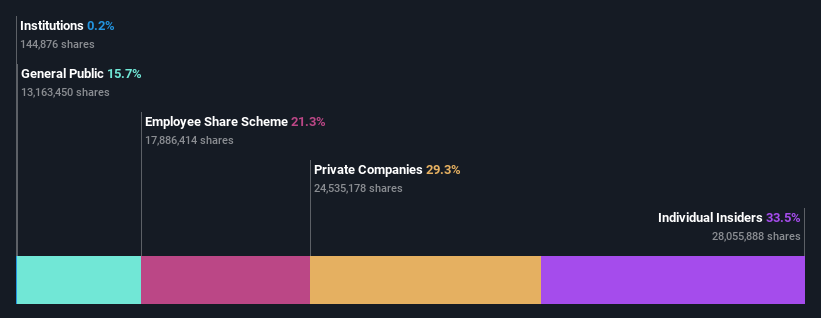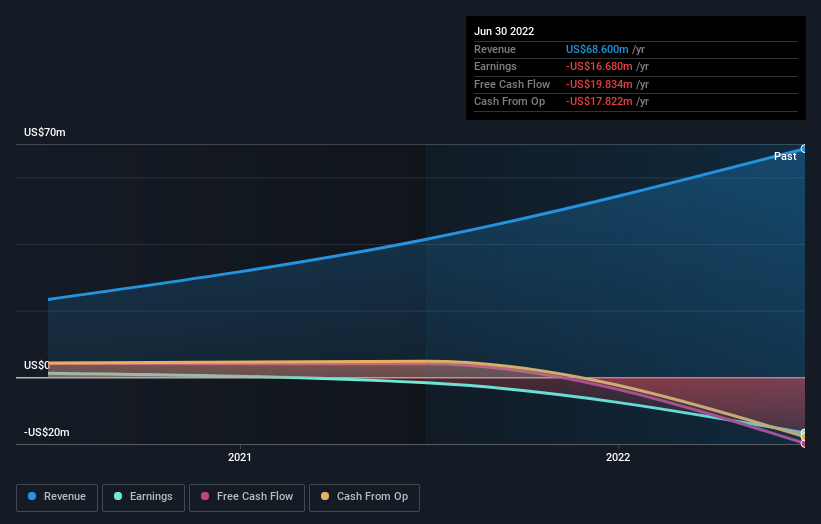Baijiayun Group Ltd's (NASDAQ:RTC) largest shareholder, CEO Li Gangjiang sees holdings value fall by 7.7% following recent drop
Key Insights
Insiders appear to have a vested interest in Baijiayun Group's growth, as seen by their sizeable ownership
55% of the business is held by the top 2 shareholders
Past performance of a company along with ownership data serve to give a strong idea about prospects for a business
To get a sense of who is truly in control of Baijiayun Group Ltd (NASDAQ:RTC), it is important to understand the ownership structure of the business. And the group that holds the biggest piece of the pie are individual insiders with 33% ownership. Put another way, the group faces the maximum upside potential (or downside risk).
As a result, insiders as a group endured the highest losses after market cap fell by US$55m.
In the chart below, we zoom in on the different ownership groups of Baijiayun Group.
View our latest analysis for Baijiayun Group
What Does The Lack Of Institutional Ownership Tell Us About Baijiayun Group?
Small companies that are not very actively traded often lack institutional investors, but it's less common to see large companies without them.
There are multiple explanations for why institutions don't own a stock. The most common is that the company is too small relative to funds under management, so the institution does not bother to look closely at the company. It is also possible that fund managers don't own the stock because they aren't convinced it will perform well. Baijiayun Group might not have the sort of past performance institutions are looking for, or perhaps they simply have not studied the business closely.
Hedge funds don't have many shares in Baijiayun Group. Looking at our data, we can see that the largest shareholder is the CEO Li Gangjiang with 33% of shares outstanding. With 21% and 10% of the shares outstanding respectively, Baijiayun Group Ltd, ESOP and Nuan Nuan Ltd are the second and third largest shareholders.
To make our study more interesting, we found that the top 2 shareholders have a majority ownership in the company, meaning that they are powerful enough to influence the decisions of the company.
Researching institutional ownership is a good way to gauge and filter a stock's expected performance. The same can be achieved by studying analyst sentiments. As far as we can tell there isn't analyst coverage of the company, so it is probably flying under the radar.
Insider Ownership Of Baijiayun Group
While the precise definition of an insider can be subjective, almost everyone considers board members to be insiders. Company management run the business, but the CEO will answer to the board, even if he or she is a member of it.
I generally consider insider ownership to be a good thing. However, on some occasions it makes it more difficult for other shareholders to hold the board accountable for decisions.
It seems insiders own a significant proportion of Baijiayun Group Ltd. Insiders own US$222m worth of shares in the US$664m company. This may suggest that the founders still own a lot of shares. You can click here to see if they have been buying or selling.
General Public Ownership
With a 16% ownership, the general public, mostly comprising of individual investors, have some degree of sway over Baijiayun Group. This size of ownership, while considerable, may not be enough to change company policy if the decision is not in sync with other large shareholders.
Private Company Ownership
Our data indicates that Private Companies hold 29%, of the company's shares. It might be worth looking deeper into this. If related parties, such as insiders, have an interest in one of these private companies, that should be disclosed in the annual report. Private companies may also have a strategic interest in the company.
Next Steps:
While it is well worth considering the different groups that own a company, there are other factors that are even more important. To that end, you should be aware of the 1 warning sign we've spotted with Baijiayun Group .
If you would prefer check out another company -- one with potentially superior financials -- then do not miss this free list of interesting companies, backed by strong financial data.
NB: Figures in this article are calculated using data from the last twelve months, which refer to the 12-month period ending on the last date of the month the financial statement is dated. This may not be consistent with full year annual report figures.
Have feedback on this article? Concerned about the content? Get in touch with us directly. Alternatively, email editorial-team (at) simplywallst.com.
This article by Simply Wall St is general in nature. We provide commentary based on historical data and analyst forecasts only using an unbiased methodology and our articles are not intended to be financial advice. It does not constitute a recommendation to buy or sell any stock, and does not take account of your objectives, or your financial situation. We aim to bring you long-term focused analysis driven by fundamental data. Note that our analysis may not factor in the latest price-sensitive company announcements or qualitative material. Simply Wall St has no position in any stocks mentioned.
Join A Paid User Research Session
You’ll receive a US$30 Amazon Gift card for 1 hour of your time while helping us build better investing tools for the individual investors like yourself. Sign up here

 Yahoo Finance
Yahoo Finance 

